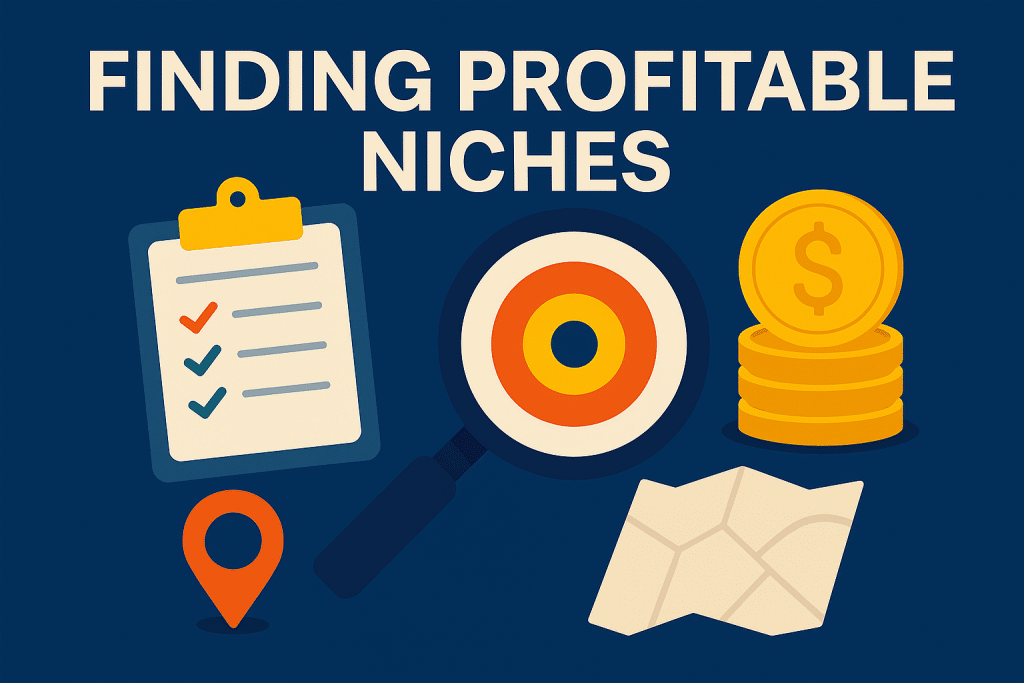Profitable Niches: The Secret Weapon for Building Your Online Empire
What is a Niche and Why is it Important?
Before we dive deep, let's define what we mean by a niche. In essence, a niche is a focused segment of a larger market. Instead of broadly targeting fitness, you might niche down to yoga for seniors or high-intensity interval training (HIIT) for busy moms. The beauty of a niche lies in its specificity. By catering to a particular audience with tailored content, products, or services, you can:
- Reduce Competition: Competing in a broad market can be daunting. Niches allow you to focus your efforts and stand out from the crowd.
- Attract a Loyal Audience: When you solve a specific problem for a specific group, you build trust and foster a loyal following.
- Increase Conversion Rates: Targeted marketing speaks directly to your audience's needs, leading to higher engagement and sales.
- Become an Authority: Specializing in a niche allows you to develop deep expertise and become a go-to resource for your audience.
Think of it like this: would you rather be a general practitioner or a highly sought-after specialist? The specialist, with their focused expertise, often commands higher fees and enjoys greater recognition within their field.
How to Brainstorm Niche Ideas?
The quest for finding profitable niches begins with brainstorming. Don't limit yourself. Let your creativity flow and consider these approaches:
- Tap into Your Passions and Interests: What do you genuinely enjoy? What are you knowledgeable about? Starting with something you're passionate about will make the journey more rewarding and sustainable.
- Identify Problems You Can Solve: What challenges do people face? What needs are not being adequately met? Look for pain points that you can alleviate with your expertise or offerings.
- Consider Your Skills and Experience: What are you good at? What expertise do you possess? Think about how you can leverage your skills to create value for others.
- Explore Existing Markets: Browse online marketplaces like Amazon, Etsy, and eBay. What are people buying? What are the top-selling products in different categories? Look for gaps or underserved areas within these markets.
Keep a running list of potential niche ideas. Don't worry about judging them at this stage. The goal is to generate as many possibilities as possible.
What are the Key Characteristics of a Profitable Niche?
Not all niches are created equal. A truly profitable niche possesses certain key characteristics:
- Sufficient Demand: There needs to be a significant number of people interested in your niche. Without demand, your efforts will be futile.
- Willingness to Pay: People must be willing to spend money on products or services within your niche. A niche with low purchasing power is unlikely to be profitable.
- Low Competition (Relatively): While competition is inevitable, avoid niches that are dominated by established players with deep pockets. Look for areas where you can carve out a unique position.
- Potential for Growth: A niche that is trending upward is more likely to be profitable in the long run. Avoid niches that are declining in popularity.
- Monetization Opportunities: There should be clear and viable ways to generate revenue within your niche, whether through selling products, offering services, affiliate marketing, or advertising.
Think about niches that offer a solution to a specific problem, cater to a passionate audience, and have the potential for recurring revenue.

How to Research Niche Profitability?
Once you have a list of potential niche ideas, it's time to do your homework. Research is crucial for validating your assumptions and ensuring that your chosen niche has the potential for profitability. Here's how to approach it:
- Keyword Research: Use tools like Google Keyword Planner, Ahrefs, or SEMrush to analyze search volume and competition for relevant keywords. This will give you an idea of the level of interest in your niche.
- Market Analysis: Research the size of your target market, their demographics, and their spending habits. Look for market reports and industry data that can provide insights into your niche.
- Competitor Analysis: Identify your main competitors and analyze their websites, products, and marketing strategies. What are they doing well? What are their weaknesses? How can you differentiate yourself?
- Trend Analysis: Use Google Trends to track the popularity of your niche over time. Are searches for relevant keywords increasing or decreasing? This will help you assess the long-term potential of your niche.
- Social Media Analysis: Monitor social media platforms for conversations and trends related to your niche. This will give you a sense of the current interest and engagement within your target audience.
The more data you gather, the better informed you'll be when making your decision. Don't skip this crucial step!
Tools for Niche Research
Fortunately, you don't have to go it alone. Numerous tools can help you with niche research:
- Google Keyword Planner: A free tool from Google that provides keyword search volume and competition data.
- Ahrefs: A comprehensive SEO tool that offers advanced keyword research, competitor analysis, and backlink analysis.
- SEMrush: Another powerful SEO tool with features for keyword research, market analysis, and advertising research.
- Google Trends: A free tool from Google that allows you to track the popularity of search terms over time.
- Ubersuggest: A more affordable SEO tool that offers keyword research, competitor analysis, and content ideas.
- AnswerThePublic: A tool that helps you discover questions that people are asking about your niche.
Experiment with different tools to find the ones that work best for you. Don't be afraid to invest in paid tools if they provide valuable insights that can help you make better decisions.
Identifying Emerging Trends and Untapped Niches
One of the most exciting aspects of finding profitable niches is discovering emerging trends and untapped opportunities. Be on the lookout for:
- New Technologies: Emerging technologies like AI, blockchain, and virtual reality are creating new opportunities for entrepreneurs.
- Changing Demographics: Shifts in demographics, such as the aging population or the rise of remote work, can create new niche markets.
- Evolving Consumer Preferences: Consumer preferences are constantly changing. Stay up-to-date on the latest trends and identify underserved needs.
- Geographic Opportunities: Consider targeting specific geographic regions with unique needs or interests.
Keep your finger on the pulse of the world and be ready to adapt to changing circumstances. The ability to identify and capitalize on emerging trends is a key to long-term success.
Examples of Profitable Niches in 2025
While the specific niches that are profitable will continue to evolve, here are some examples of areas with strong potential in 2025/2026:
- Sustainable Living: Products and services related to eco-friendly living, renewable energy, and waste reduction.
- Remote Work Solutions: Tools and resources for remote workers, freelancers, and digital nomads.
- Online Education: Courses and training programs on a wide range of topics, from coding to creative writing.
- Mental Wellness: Products and services related to mindfulness, meditation, and stress reduction.
- Pet Care: High-quality pet food, innovative pet toys, and specialized pet services.
- Home Fitness: At-home workout equipment, online fitness classes, and personalized nutrition plans.
- AI-Powered Tools: Specific applications of artificial intelligence that solve a problem or automate a task for a particular industry or demographic.
These are just a few examples to get you started. Remember to conduct your own research to identify specific niches within these broader categories that align with your interests and expertise.
Validating Your Niche Idea Before Investing Time and Resources
Before you pour your heart and soul (and your savings!) into a niche idea, it's crucial to validate it. This means testing the waters to see if there's genuine demand and willingness to pay. Here are a few ways to validate your niche:
- Create a Minimum Viable Product (MVP): Develop a basic version of your product or service and offer it to a small group of potential customers to get feedback.
- Run a Crowdfunding Campaign: Launch a crowdfunding campaign to gauge interest in your product or service and raise capital.
- Build a Landing Page: Create a landing page to collect email addresses from people interested in your niche. This will give you a sense of the level of demand.
- Offer Free Content: Create valuable content related to your niche and offer it for free in exchange for email addresses or social media follows. This will help you build an audience and gauge interest.
- Engage in Online Communities: Participate in online forums, social media groups, and other communities related to your niche. This will allow you to connect with potential customers and get feedback on your ideas.
Validation is all about minimizing risk and maximizing your chances of success. Don't be afraid to pivot if your initial idea doesn't resonate with your target audience.
Strategies for Monetizing Your Niche
Once you've identified a profitable niche and validated your idea, it's time to think about monetization. Here are some common strategies for generating revenue:
- Selling Physical Products: Create and sell your own physical products or dropship products from other suppliers.
- Selling Digital Products: Develop and sell digital products such as ebooks, online courses, software, or templates.
- Offering Services: Provide services related to your niche, such as consulting, coaching, or design.
- Affiliate Marketing: Promote other people's products or services and earn a commission on each sale.
- Advertising: Display ads on your website or blog.
- Sponsorships: Partner with brands to promote their products or services to your audience.
- Memberships: Create a membership program that provides exclusive content, resources, and community access to paying members.
Consider which monetization strategies align best with your niche, your skills, and your resources. You can also combine multiple strategies to maximize your revenue potential.

Common Mistakes to Avoid When Choosing a Niche
Choosing the wrong niche can be a costly mistake. Here are some common pitfalls to avoid:
- Choosing a Niche That is Too Broad: A broad niche will be difficult to compete in and will make it harder to attract a loyal audience.
- Choosing a Niche That You're Not Passionate About: You'll quickly lose interest if you're not genuinely passionate about your niche.
- Ignoring Market Demand: Don't assume that there's demand for your niche idea. Do your research!
- Underestimating Competition: Be realistic about the level of competition in your niche.
- Failing to Validate Your Idea: Don't invest too much time and money into a niche idea before validating it.
By avoiding these common mistakes, you can increase your chances of finding profitable niches and building a successful online business.
Scaling Your Online Empire Within Your Niche
Once you've established a presence in your niche and are generating revenue, it's time to think about scaling your business. Here are some strategies for growth:
- Expand Your Product Line: Offer new products or services that complement your existing offerings.
- Reach a Wider Audience: Expand your marketing efforts to reach new customers.
- Automate Your Processes: Use technology to automate repetitive tasks and free up your time.
- Build a Team: Hire employees or contractors to help you manage your business.
- Diversify Your Income Streams: Explore new monetization opportunities to reduce your reliance on a single source of revenue.
Scaling requires careful planning and execution. Focus on building a sustainable business that can grow over time.
The Future of Niche Marketing
Niche marketing is constantly evolving. Here are some trends to watch for in the future:
- Increased Personalization: Consumers will expect even more personalized experiences from brands.
- AI-Powered Marketing: Artificial intelligence will play a growing role in niche marketing, from content creation to customer service.
- Emphasis on Community: Building a strong community around your niche will become even more important.
- Focus on Sustainability: Consumers will increasingly demand sustainable and ethical products and services.
By staying ahead of the curve and adapting to changing trends, you can position yourself for long-term success in the world of niche marketing.

